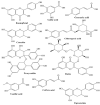Phyto-Enrichment of Yogurt to Control Hypercholesterolemia: A Functional Approach
- PMID: 35684416
- PMCID: PMC9182380
- DOI: 10.3390/molecules27113479
Phyto-Enrichment of Yogurt to Control Hypercholesterolemia: A Functional Approach
Abstract
Cholesterol is essential for normal human health, but elevations in its serum levels have led to the development of various complications, including hypercholesterolemia (HC). Cholesterol accumulation in blood circulation formsplaques on artery walls and worsens the individuals' health. To overcome this complication, different pharmacological and non-pharmacological approaches are employed to reduce elevated blood cholesterol levels. Atorvastatin and rosuvastatin are the most commonly used drugs, but their prolonged use leads to several acute side effects. In recent decades, the potential benefit of ingesting yogurt on lipid profile has attracted the interest of researchers and medical professionals worldwide. This review aims to give an overview of the current knowledge about HC and the different therapeutic approaches. It also discusses the health benefits of yogurt consumption and highlights the overlooked phyto-enrichment option to enhance the yogurt's quality. Finally, clinical studies using different phyto-enriched yogurts for HC management are also reviewed. Yogurt has a rich nutritional value, but its processing degrades the content of minerals, vitamins, and other vital constituents with beneficial health effects. The option of enriching yogurt with phytoconstituents has drawn a lot of attention. Different pre-clinical and clinical studies have provided new insights on their benefits on gut microbiota and human health. Thus, the yogurtphyto-enrichment with stanol and β-glucan have opened new paths in functional food industries and found healthy andeffective alternatives for HC all along with conventional treatment approaches.
Keywords: functional foods; hypercholesterolemia; phyto-enrichment; yogurt.
Conflict of interest statement
The authors declare no conflict of interest.
Figures
Similar articles
-
Hepatoprotective effects of synbiotic soy yogurt on mice fed a high-cholesterol diet.Nutrition. 2019 Jul-Aug;63-64:36-44. doi: 10.1016/j.nut.2019.01.009. Epub 2019 Jan 24. Nutrition. 2019. PMID: 30927645
-
The Potential Role of Yogurt in Weight Management and Prevention of Type 2 Diabetes.J Am Coll Nutr. 2016 Nov-Dec;35(8):717-731. doi: 10.1080/07315724.2015.1102103. Epub 2016 Jun 22. J Am Coll Nutr. 2016. PMID: 27332081 Review.
-
Efficacy of yogurt drink with added plant stanol esters (Benecol®, Colanta) in reducing total and LDL cholesterol in subjects with moderate hypercholesterolemia: a randomized placebo-controlled crossover trial NCT01461798.Lipids Health Dis. 2014 Aug 6;13:125. doi: 10.1186/1476-511X-13-125. Lipids Health Dis. 2014. PMID: 25099071 Free PMC article. Clinical Trial.
-
Dietary supplementation contributes to lifestyle improvement in hypercholesterolemic patients in real-life contexts.Curr Med Res Opin. 2014 Jul;30(7):1309-16. doi: 10.1185/03007995.2014.890924. Epub 2014 Mar 20. Curr Med Res Opin. 2014. PMID: 24502771
-
Functional yogurt, enriched and probiotic: A focus on human health.Clin Nutr ESPEN. 2023 Oct;57:575-586. doi: 10.1016/j.clnesp.2023.08.005. Epub 2023 Aug 5. Clin Nutr ESPEN. 2023. PMID: 37739708 Review.
References
-
- Verschuren W.M., Jacobs D.R., Bloemberg B.P., Kromhout D., Menotti A., Aravanis C., Toshima H. Serum total cholesterol and long-term coronary heart disease mortality in different cultures: Twenty-five-year follow-up of the seven countries study. JAMA. 1995;274:131–136. doi: 10.1001/jama.1995.03530020049031. - DOI - PubMed
-
- Stamler J., Daviglus M.L., Garside D.B., Dyer A.R., Greenland P., Neaton J.D. Relationship of baseline serum cholesterol levels in 3 large cohorts of younger men to long-term coronary, cardiovascular, and all-cause mortality and to longevity. JAMA. 2000;284:311–318. doi: 10.1001/jama.284.3.311. - DOI - PubMed
-
- Baigent C., Keech A., Kearney P.M., Blackwell L., Buck G., Pollicino C. Efficacy and safety of cholesterol-lowering treatment: Prospective meta-analysis of data from 90056 participants in 14 randomised trials of statins. Lancet. 2005;366:1267–1278. - PubMed
-
- Guallar-Castillón P., Gil-Montero M., León-Muñoz L.M., Graciani A., Bayán-Bravo A., Taboada J.M., Rodríguez-Artalejo F. Magnitude and management of hypercholesterolemia in the adult population of Spain, 2008–2010: The ENRICA Study. Rev. Esp. Cardiol. 2012;65:551–558. doi: 10.1016/j.recesp.2012.02.005. - DOI - PubMed
-
- Catapano A.L., Reiner Ž., De Backer G., Graham I., Taskinen M.R., Wiklund O., Wood D. ESC/EAS Guidelines for the management of dyslipidaemias: The Task Force for the management of dyslipidaemias of the European Society of Cardiology (ESC) and the European Atherosclerosis Society (EAS) Atherosclerosis. 2011;217:1–44. doi: 10.1016/j.atherosclerosis.2011.06.012. - DOI - PubMed
Publication types
MeSH terms
Substances
LinkOut - more resources
Full Text Sources
Medical




